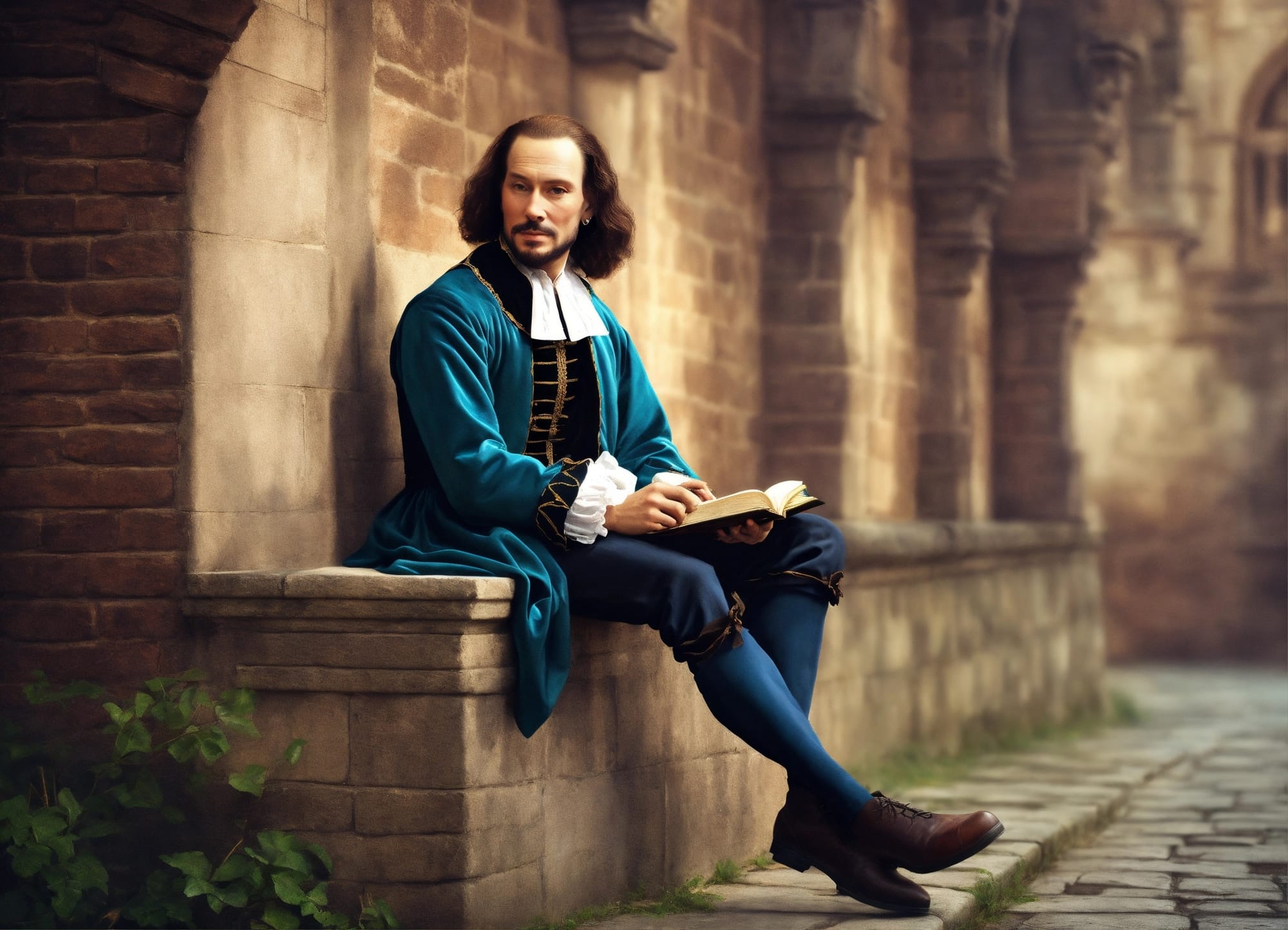William "Will" Shakespeare had just turned 13 in 2025, and his English teacher, Ms. Henderson, was beginning to seriously question her career choices.
"William, please read your sonnet aloud to the class," she said, hoping against hope that this time he'd written something that didn't include the phrase "no cap."
Will stood up, clearing his throat dramatically. He'd been working on his latest piece during lunch, frantically typing on his cracked iPhone 16 while his friends roasted him for "being Shakespeare about it" – a phrase that had somehow become school slang for being unnecessarily dramatic about everything.
"Sonnet 18.2: Shall I Compare Thee to a Summer's Day (Taylor's Version)," he began, ignoring Ms. Henderson's visible eye twitch.
"Shall I compare thee to a summer's day?
Thou art more mid, and way less of a vibe.
Rough winds do shake the trees (that's kinda gay),
And summer's lease is short—unlike your tribe
Of followers who ghost when you're not posting,
Sometimes too hot the eye of Helios shines,
And often his gold complexion's roasting
Like my mom's lasagna—which absolutely slimes.
But thy eternal summer shall not fade,
Nor lose possession of thy rizz so fair,
Nor shall death brag thou wander'st in his shade
When in eternal TikToks thou dost share.
So long as teens can breathe and eyes can see,
So long lives this—periodt, bestie."
The classroom fell silent. Jessica, who'd been filming the whole thing for her Snapchat story, slowly lowered her phone. Even Tyler, who usually spent English class trying to build the perfect paper airplane, was staring.
"William," Ms. Henderson said slowly, "what exactly is... 'rizz'?"
"It's like... charisma, but make it Gen-Z," Will explained, as if this clarified everything. "You know, like when someone's got that main character energy? That's rizz."
"And 'slimes'?"
"It slaps, but worse. Like, it's so bad it's good? But mostly bad?"
Ms. Henderson rubbed her temples. Three months ago, Will had turned in a modern translation of Romeo and Juliet where Romeo slid into Juliet's DMs with "hey stranger danger, wanna catch these feels?" and Juliet replied with a series of skull emojis before declaring "this whole family feud is giving toxic energy, let's just run away and start a podcast."
The truly maddening part was that Will was brilliant. His understanding of meter, rhythm, and wordplay was genuinely impressive. He'd just... evolved the language in ways that made Ms. Henderson question whether she was having a stroke.
"For homework," she announced to the class, "I want everyone to write a traditional sonnet. Traditional, William. No internet slang, no references to social media, and definitely no 'Taylor's Version' in the title."
Will raised his hand. "But Ms. H, language is meant to evolve, right? Like, Shakespeare himself was basically the Gen-Z of his time. He made up words, he was always extra about everything, and he definitely would have been canceled on Twitter for some of the stuff he wrote."
"That's... actually not entirely wrong," Ms. Henderson admitted reluctantly.
"Plus," Will continued, warming to his theme, "if Shakespeare were alive today, he'd totally be on TikTok. Think about it—short, punchy content designed to go viral? Hamlet's 'To be or not to be' would've been a trending audio. Romeo and Juliet would've been an enemies-to-lovers series that broke the internet. And don't even get me started on how Much Ado About Nothing is basically just a Twitter beef that got out of hand."
The class was actually paying attention now, which was more than Ms. Henderson had achieved all semester.
"He'd have like 50 million followers," added Jessica, who was apparently having an epiphany. "And all the English teachers would be like 'kids these days don't appreciate real literature' while everyone's obsessing over his latest drop."
"Right?" Will grinned. "The Tempest would've been an AR filter. Macbeth would've been a psychological thriller podcast. The man knew how to work his audience."
Ms. Henderson found herself nodding along. "You know what, class? For your next assignment, I want you to imagine how Shakespeare would adapt his work for modern audiences. But—" she held up a finger as Will's eyes lit up dangerously, "you still need to demonstrate understanding of the original themes and literary devices."
"Bet," said Will, already pulling out his phone to start taking notes. "This is about to be absolutely bussin."
"I'm going to regret this, aren't I?" Ms. Henderson muttered.
Two weeks later, Will submitted "The Tragedy of Macbeth: A True Crime Podcast," complete with theme music he'd composed on GarageBand and dramatic reenactments featuring his little sister as Lady Macbeth (she'd demanded payment in Robux for her performance).
Ms. Henderson listened to the entire 47-minute episode during her lunch break. It was... actually good. Really good. Will had managed to preserve every major theme and plot point while making it genuinely engaging for his peers. His Lady Macbeth was a influencer-turned-political-wife whose hunger for power played out through carefully crafted social media campaigns. The witches were anonymous accounts spreading conspiracy theories. And Macbeth's descent into paranoia was brilliantly portrayed through increasingly unhinged Instagram stories.
When she handed back the assignment—marked with an A+—Will practically vibrated with excitement.
"Does this mean I can do King Lear as a reality TV show next?" he asked hopefully.
Ms. Henderson considered this. On one hand, her principal would probably have questions. On the other hand, her students were more engaged with literature than they'd been all year.
"Let's start with Othello," she said. "I'm thinking... dating app gone wrong?"
Will's grin could have powered the entire school. "Ms. H, you're about to witness peak fiction. This is going to be absolutely fire."
As the bell rang and students filed out, chattering excitedly about their next projects, Ms. Henderson realized something: maybe the real Shakespeare had been the friends they'd made along the way. Or something like that.
She made a mental note to update her lesson plans. And maybe ask her teenage nephew what "bussin" actually meant.






